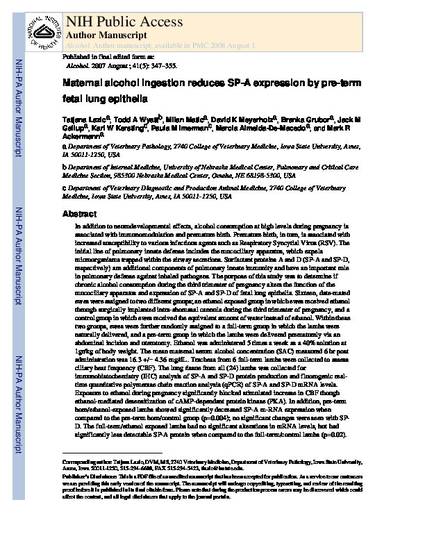
Article
Maternal alcohol ingestion reduces SP-A expression by pre-term fetal lung epithelia
Alcohol
Document Type
Article
Publication Date
8-1-2007
DOI
10.1016/j.alcohol.2007.07.006
Abstract
In addition to neurodevelopmental effects, alcohol consumption at high levels during pregnancy is associated with immunomodulation and premature birth. Premature birth, in turn, is associated with increased susceptibility to various infectious agents such as Respiratory Syncytial Virus (RSV). The initial line of pulmonary innate defense includes the mucociliary apparatus, which expels microorganisms trapped within the airway secretions. Surfactant proteins A and D (SP-A and SP-D, respectively) are additional components of pulmonary innate immunity and have an important role in pulmonary defense against inhaled pathogens. The purpose of this study was to determine if chronic alcohol consumption during the third trimester of pregnancy alters the function of the mucociliary apparatus and expression of SP-A and SP-D of fetal lung epithelia. Sixteen, date-mated ewes were assigned to two different groups; an ethanol exposed group in which ewes received ethanol through surgically implanted intra-abomasal cannula during the third trimester of pregnancy, and a control group in which ewes received the equivalent amount of water instead of ethanol. Within these two groups, ewes were further randomly assigned to a full-term group in which the lambs were naturally delivered, and a pre-term group in which the lambs were delivered prematurely via an abdominal incision and uterotomy. Ethanol was administered 5 times a week as a 40% solution at 1gr/kg of body weight. The mean maternal serum alcohol concentration (SAC) measured 6 hr post administration was 16.3 +/− 4.36 mg/dL. Tracheas from 6 full-term lambs were collected to assess ciliary beat frequency (CBF). The lung tissue from all (24) lambs was collected for immunohistochemistry (IHC) analysis of SP-A and SP-D protein production and fluorogenic real-time quantitative polymerase chain reaction analysis (qPCR) of SP-A and SP-D mRNA levels. Exposure to ethanol during pregnancy significantly blocked stimulated increase in CBF though ethanol-mediated desensitization of cAMP-dependant protein kinase (PKA). In addition, pre-term born/ethanol-exposed lambs showed significantly decreased SP-A m-RNA expression when compared to the pre-term born/control group (p=0.004); no significant changes were seen with SP-D. The full-term/ethanol exposed lambs had no significant alterations in mRNA levels, but had significantly less detectable SP-A protein when compared to the full-term/control lambs (p=0.02). These findings suggest that chronic maternal ethanol consumption during the third trimester of pregnancy alters innate immune gene expression in fetal lung. These alterations may underlie increased susceptibility of pre-term infants, exposed to ethanol in utero, to RSV and other microbial agents.
Copyright Owner
Elsevier Ltd.
Copyright Date
2007
Language
en
File Format
application/pdf
Citation Information
Tatjana Lazic, Todd A. Wyatt, Milan Matic, David K. Meyerholz, et al.. "Maternal alcohol ingestion reduces SP-A expression by pre-term fetal lung epithelia" Alcohol Vol. 41 Iss. 5 (2007) p. 347 - 355 Available at: http://works.bepress.com/jack_gallup/35/

This is a post-print of an article from Alcohol 41, no. 5 (August 2007): 347–355, doi:10.1016/j.alcohol.2007.07.006.